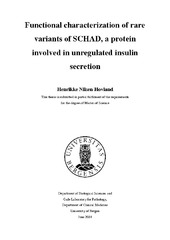| dc.contributor.author | Hovland, Henrikke Nilsen | |
| dc.date.accessioned | 2018-08-03T10:39:17Z | |
| dc.date.available | 2018-08-03T10:39:17Z | |
| dc.date.issued | 2018-06-26 | |
| dc.date.submitted | 2018-06-25T22:00:10Z | |
| dc.identifier.uri | http://hdl.handle.net/1956/17975 | |
| dc.description.abstract | Congenital Hyperinsulinism of Infancy (CHI) is a group of rare inherited disorders characterized by persistent hypoglycaemia due to inappropriate elevated secretion of insulin from the pancreatic beta cells. CHI can be caused by abnormalities in at least 10 genes. One of them, HADH, encodes the mitochondrial enzyme SCHAD, which has two functions: it catalyses the third step in the oxidation of fatty acids, and it has been reported to negatively regulate the enzyme glutamate dehydrogenase (GDH). Inactivating mutations in HADH lead to a loss of the inhibitory protein interaction of SCHAD, which then cause increased insulin secretion due to overactive GDH. We here aimed to understand the functional impact of rare SCHAD variants present in human populations. We have explored the effect of four pathogenic SCHAD variants with regard to the level of expression, subcellular localization and enzymatic activity. Two of the variants (G34R and I184F) showed protein instability and had clearly reduced level of protein expression in HEK293 cells. The mRNA levels appeared normal, which indicated that the cause of instability lies downstream of the transcription. The two other variants (K136E and M188V) had normal protein expression levels in HEK293 cells, but a severely reduced enzymatic activity compared to the wild type protein. The four SCHAD mutations did not affect the mitochondrial localization of the protein. In addition to the four pathogenic variants, protein stability of 11 other rare SCHAD variants was tested in HEK293 cells by the use of the protein synthesis inhibitor cycloheximide. Four additional variants were found to be unstable (I33M, H170R, P258 and G303S). The effect of the different SCHAD variants on GDH interaction was evaluated by co-immunoprecipitation. Protein:protein interaction could be detected for the SCHAD wild type protein, whereas several of the other variants seemed to have reduced or lost binding to GDH. The data gathered throughout the study were in combination with other relevant information used to reclassify the pathogenicity of a total of 16 rare SCHAD variants present in human populations. Taken together, our results illustrate the extensive work necessary for evaluating the functional impact of rare variants that are identified in highthroughput sequencing of human genomes. | en_US |
| dc.language.iso | eng | eng |
| dc.publisher | The University of Bergen | en_US |
| dc.subject | Congenital Hyperinsulinism of Infancy | eng |
| dc.subject | Insulin | eng |
| dc.subject | Hypoglycaemia | eng |
| dc.subject | SCHAD | eng |
| dc.subject | Mitochondrial enzyme | eng |
| dc.subject | Molekylærbiologi | eng |
| dc.subject.mesh | Congenital Hyperinsulinism | eng |
| dc.subject.mesh | Insulin | eng |
| dc.subject.mesh | Hypoglycaemia | eng |
| dc.subject.mesh | HADHA protein, human | eng |
| dc.subject.mesh | 3-Hydroxyacyl-CoA Dehydrogenase Deficiency | eng |
| dc.subject.mesh | Molecular Biology | eng |
| dc.subject.mesh | Molecular Medicine | eng |
| dc.title | Functional characterization of rare variants of SCHAD, a protein involved in unregulated insulin secretion | en_US |
| dc.type | Master thesis | |
| dc.date.updated | 2018-06-25T22:00:10Z | |
| dc.rights.holder | Copyright the Author. All rights reserved | en_US |
| dc.description.degree | Masteroppgåve i molekylærbiologi | en_US |
| dc.description.localcode | MAMN-MOL | |
| dc.description.localcode | MOL399 | |
| dc.subject.nus | 759929 | eng |
| dc.subject.nsi | VDP::Medisinske Fag: 700::Basale medisinske, odontologiske og veterinærmedisinske fag: 710::Medisinsk molekylærbiologi: 711 | en_US |
| fs.subjectcode | MOL399 | |
| fs.unitcode | 12-60-0 | |
